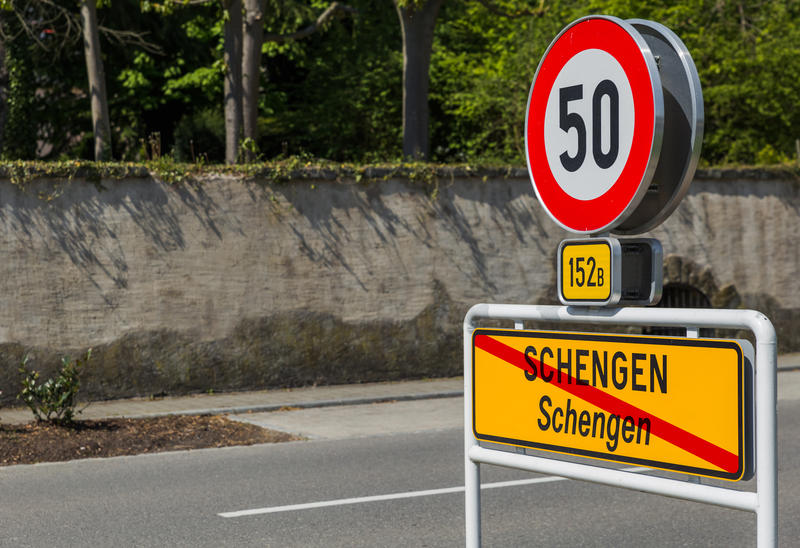The Austrian political scientist Prof. Reinhard Heinisch commented in an interview for the Bulgarian national radio station BNR on the internal reason for the blockade imposed by the national conservative government in Vienna for the accession of Bulgaria and Romania to Schengen. Heinisch emphasized that, after next year’s parliamentary elections, Austria will give up its veto for Schengen, Rador Radio Romania quotes.
Schengen areaPhoto: Nikolai Sorokin / Dreamstime.com
“What could rather lead the government to give up the blockade are the interests of Austrian business. During the parliamentary debates, it was found that Austrian companies suffer losses due to the fact that Bulgaria and Romania are not yet in Schengen. The ruling People’s Party is not just a conservative party allied with the far right. It is a party that defends the interests of the business community, and business already understands that the veto hinders economic relations with Bulgaria and Romania,” said Reinhard Heinisch.
Prime Minister Marcel Ciolacu confirmed on Monday evening that Romania opposes the access of two Austrian army officers at NATO meetings and accuses the Chancellor of Austria, Karl Nehammer, of hypocrisy regarding the position regarding Romania’s accession to the Schengen Area.
Asked, on Monday evening, on Antena 3, if the information according to which Romania opposes the access of two Austrian army officers to NATO meetings is true, Prime Minister Marcel Ciolacu replied: “Definitely!”.
“What Chancellor Nehammer is doing is unacceptable. First of all, I, in the position of prime minister, and his lordship, are transients. You have the right to veto. The European Commission, the European Council, the European Parliament made a recommendation. You have the right to veto, but you have to justify it. That’s why I said: as long as I’m prime minister, I won’t accept the chancellor being a hypocrite and humiliating Romania further. In fact, Romania is behind the Ukrainian front. While Romania respects all sanctions against Russia, all of them, without exception, while Romania helps the Republic of Moldova to stop being dependent on Russia (…) you, Austria, are a neutral country, don’t spend a single euro on endowment of the Army , Romania increases its GDP allocation from 2% to 2.5% to deter what Russia wants to do. And you come as a hypocrite and say that Romania has no right in Schengen without justifying your veto at all”, stated Marcel Ciolacu, according to News.ro.
He specified that, in his opinion, the 7 billion euros with which Austria bought gas and oil from Russia, since the beginning of the war, are being used to fuel the conflict started by Russia in Ukraine.
We remind you that the Austrian newspaper Kurier wrote that two officers of the Austrian armed forces in Brussels have been waiting for weeks for their accreditation to the Alliance because their access is delayed by Romania, which asked for time to think.
The Foreign Ministry in Vienna told APA on Saturday that Romania requested more time, until mid-October, to make a decision on the voluntary secondment of two officers from the Austrian Armed Forces to NATO headquarters.
Why is Austria opposed?
Austria insists that the Schengen system does not work. The December 2022 refusal to allow Romania and Bulgaria to join was mainly based on figures from the Austrian Ministry of the Interior: 100,000 “illegal border crossings” in Austria, of which 75,000 were not registered in any other EU country.
However, the most active migration route to the EU is not through Romania and Bulgaria, and this is also confirmed by Frontex data.
Western Balkans Route it is one of the main migration routes to Europe. The Western Balkans route refers to illegal arrivals to the EU through this region, which includes: Albania, Bosnia and Herzegovina, Kosovo, Montenegro, North Macedonia and Serbia. So the arrivals in Austria could be mainly via Hungary and Croatia.
Why does Austria not see the evidence?
The speech of the officials in Vienna is largely for domestic use. In the pre-election years, 2022, 2023 and 2024, the authorities faced an obvious problem.
According to Eurostat data, asylum applications have almost tripled in Austria from 37,000 to 108,000. They were asylum seekers before. But they did not “see” each other. With the outbreak of the war in Ukraine, the asylum centers were filled with refugees and the authorities were overstretched, with many of the other migrants on the streets and very visible, which created a real political problem.
In elections earlier this year in Lower Austria, the traditional parties, the conservative ÖVP and the social democrats SPÖ, suffered historic defeats, while the far right gained ground. Austrian Chancellor Karl Nehammer explained that the disastrous result achieved by the Austrian People’s Party (ÖVP) is mainly due to the last “years of crisis”. The ÖVP reached its worst result since 1945 and lost its absolute majority in the lower Austrian parliament. (photo: Nikolai Sorokin / Dreamstime.com)

